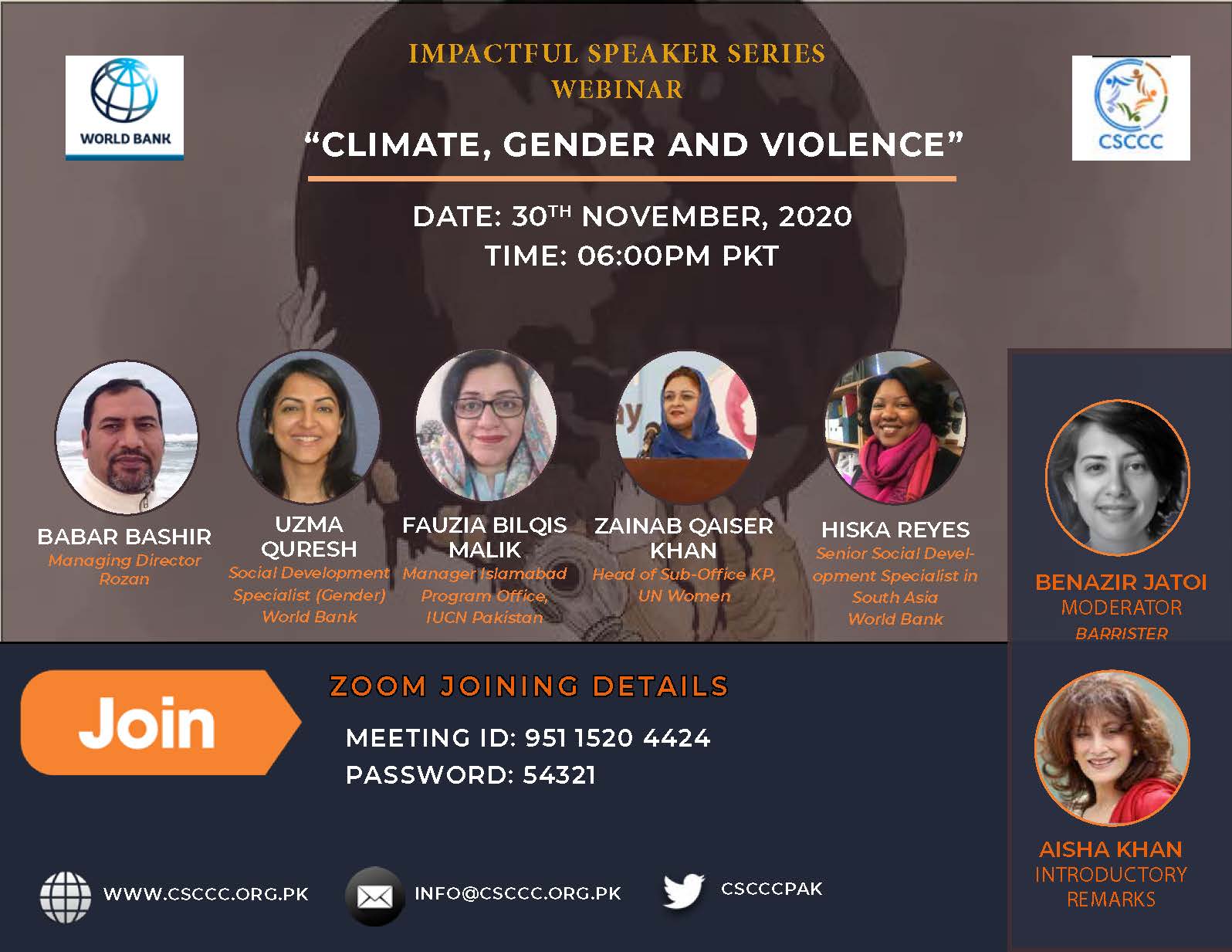Climate, Gender and Violence
Nov 30 2020 | 10:12:58
Ms. Aisha Khan, Executive Director, Civil Society Coalition for Climate Change, gave the opening remarks, citing the need for establishing linkages between climate change and gender-based violence (GBV), and growing research output, as the motivation behind the World Bank sponsored webinar. Ms. Benzair Jatoi, a barrister working on gender issues in Pakistan, served as moderator for the session, calling attention to the 16 Days of Activism on Gender-Based Violence, the international United Nations campaign spearheaded as part of celebrations for the International Day for the Elimination of Violence against Women. Mr. Babar Bashir, Managing Director of Rozan, a Pakistani NGO, built context on gender disparity, noting that one in three women and girls face violence globally. He posited that there is a serious need for engagement of men and boys to break the cycle of abuse before it begins, and to reconstitute the power structures inherent in the dominantly patriarchal societies of South Asia. Ms. Uzma Qureshi, Social Development Specialist at the World Bank (Pakistan), pointed to the seriousness of global financiers to enhance gender input in development programs, citing the 5-year Enhanced Lima Work Programme on Gender agreed upon at the 25th Conference of Parties to the United Nations Framework Convention on Climate Change. As echoed by other panelists, Ms. Qureshi laid out the structural arguments for gender balance present in the various national climate policies of South Asia, but lamented that implementation of these policies remain laggard. However, she also highlighted successful strategies for the engagement of women in multiple climate and development projects undertaken by the World Bank and South Asian countries, including the establishment of quota for women’s employment in development projects.Ms. Hiska Reyes, Senior Social Development Specialist at the World Bank and Coordinator of the WEvolve Initiative, brought forward issues pertaining to the changing landscape of gender action during COVID-19. While the initial lockdown periods created new stresses on development resources, Ms. Reyes stated that lessons from previous pandemics helped the World Bank pivot effectively to respond to the second wave of COVID-19 by integrating GBV messaging into interventions such as targeted direct cash transfers and food vouchers. Ms. Fauzia Bilqis Malik, Manager Islamabad Programme Office, IUCN Pakistan, elaborated on the importance given to the role of gender action in all financing channelized through Green Climate Fund, the largest climate finance mechanism available for developing countries. With a GCF readiness grant, IUCN Pakistan is now pushing forward on mainstreaming gender into the National Climate Change Policy, with key sectoral analysis in energy, water, agriculture and health sectors. Ms. Zainab Khan, Head of the Sub-Office Khyber Pakhtunkhwa for UN Women Pakistan, brought in the perspective of rural women, noting that the failure of the state and society to furnish women with access to markets, policy making and information was detrimental to building resilience not only to climate risks, but also to overall societal development. She informed on the rise in child marriages post-2010 floods in Pakistan and the continual low level of access to critical services for rural women due to lack of identification card registrations. She strongly urged for sensitization of policy makers to GBV issues under holistic approaches.
Key Takeaways
· Lack of sector-specific, disaggregated data hampers iterative policy development, implementation and monitoring and evaluation, with regard to gender inclusivity and violence· The role of local government is imperative in supporting improvements in democratic processes and gender equality· A quota system for gender balanced participation in development agenda, particularly employment, remains a viable strategy for empowering women and girls to overcome GBV· Training of local women councilors and attributing specified percentages within development and governance budgets enhances holistic community engagement at the local level· Beyond local level community engagement, integrating gender perspectives through sensitization of top level policy makers increases the flow of gender-balanced development funding · Alongside a focus on women, investment in participatory approaches that target men and boys can induce societal transformations, being most effective before the cycle of abuse begins· It is not merely enough for men to support in core domestic responsibilities, concerted effort towards sharing of domestic power is required· Organizing women at grassroots level is critical to building resilience and overcoming natural shocks· The COVID-19 pandemic response has taught that the loss of livelihood across any domestic partnership increases the burden of responsibility on women far more than on men· Lessons from previous pandemics played a large part in rolling out a blended development response from key international financing mechanisms, mixing traditional and non-traditional access modalities to reduce gender disparity· Targeted direct cash transfers/food vouchers to women assisted in securing recovery efforts in the post-COVID new normal· Digitization of GBV services are becoming a valid way for women to gain assistance, but in-person help centers must continue to support GBV victims who are unable to shift towards digitization in circumstances· Integration of gender/GBV messaging within all development programs provides new avenues for building on past efforts, while mainstreaming gender/GBV issues to the highest levels of decision making· Scaling up of research and knowledge platforms on the climate-gender nexus requires data generation, analysis, transparency and accountability · Aligning all policies and development work with reporting frameworks for the SDGs secures financing from systemic shocks while attracting climate financiers, particularly the GCF· Improvements in democratic process and institutional strengthening are core functions of generating gender equality in the developing world
